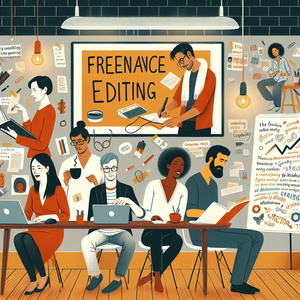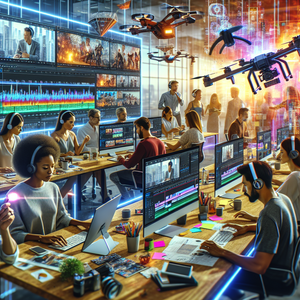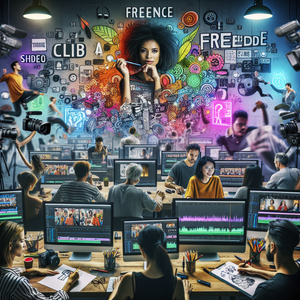
Your Guide to Thriving in the Freelance Editing World: Uncovering Career Paths and Opportunities
In today’s fast-paced digital environment, the demand for adept editors is on the rise, prompting many to explore freelance editing as a fulfilling and flexible career choice. Freelance editors are essential to the writing industry, enhancing everything from manuscripts to online content, ensuring that the material is clear, cohesive, and engaging for its intended audience. This guide will delve into various editing roles, discuss the skills and qualifications necessary for success, and illuminate the diverse paths aspiring editors can take to carve out their niche in this rewarding field.
Job Summaries:
Freelance Editor:
- Freelance editors polish written work across different formats, such as books, articles, and blogs.
- Their primary responsibilities include reviewing content for grammatical accuracy, stylistic consistency, and structural integrity, all while preserving the author’s unique voice.
- Essential skills for this role include a strong command of language, meticulous attention to detail, and the ability to provide constructive feedback.
- Although many in this field come from backgrounds in English, journalism, or communications, a genuine passion for writing and a well-developed portfolio can be the gateway for newcomers.
- To kickstart your freelance editing career, explore job listings and craft a compelling portfolio that highlights your strengths and versatility.
Copy Editor:
- Copy editors are the final polishers of text before publication.
- They ensure clarity, consistency, and adherence to established style guidelines.
- They work closely with writers and publishers to correct grammatical errors.
- They refine sentence structure and enhance content flow.
- Typically, a bachelor’s degree in English, journalism, or a related field is beneficial.
- Familiarity with style manuals such as APA or Chicago is important.
- Copy editors are crucial to the publishing process, safeguarding the integrity of the content.
- Consider diving into copy editing roles to further hone your skills.
Proofreader:
- Serving as the last checkpoint in the editing process, proofreaders meticulously identify and rectify typographical and formatting errors before publication.
- Their keen attention to detail ensures that the final product is polished and professional.
- Although formal education can be advantageous, many proofreaders develop their expertise through hands-on experience and exposure to diverse content.
- This role is perfect for individuals who thrive on precision and excel under pressure.
- Look for proofreading positions that align with your competencies.
Developmental Editor:
- Developmental editors work with authors in the early stages of writing, focusing on manuscript structure and thematic development.
- They provide feedback on elements like plot progression, character development, and narrative cohesion.
- A solid understanding of storytelling and excellent communication skills are critical for success in this role.
- Many developmental editors have experience as writers, which can be particularly advantageous.
- This position is ideal for those eager to influence narratives from their inception.
- Investigate developmental editing opportunities for a rewarding career in this specialized area.
Content Editor:
- Content editors oversee and manage editorial content for websites, blogs, and other digital platforms.
- Their responsibilities include curating articles, ensuring alignment with brand messaging, and optimizing for SEO.
- Strong writing and analytical abilities are crucial, along with familiarity with content management systems.
- A degree in communications, marketing, or a related field can be helpful.
- In the current digital landscape, content editors significantly impact online visibility and audience engagement.
- Explore content editing roles where you can apply your editorial talents in a vibrant setting.
Video Editor:
- Video editors craft visual narratives by assembling recorded footage, adding effects, and ensuring a seamless final product.
- Collaborating closely with directors and producers, they ensure the visual storytelling aligns with the intended message.
- Proficiency in editing software like Adobe Premiere Pro or Final Cut Pro is essential, as is a flair for storytelling through visuals.
- This role is well-suited for creative individuals with a keen eye for detail.
- Pursue video editing positions to broaden your creative horizons within the freelance sector.
Social Media Editor:
- Social media editors are responsible for creating, curating, and managing content across various social media platforms.
- They craft engaging posts, analyze audience engagement metrics, and maintain brand consistency.
- A strong grasp of digital marketing and social media trends is essential, alongside excellent writing skills.
- Many social media editors come from marketing or communications backgrounds.
- This role is crucial for businesses seeking to enhance their online presence and build connections with their audience.
- Seek social media editing positions to make a significant impact in the digital realm.
Academic Editor:
- Specializing in academic writing, academic editors refine scholarly articles, research papers, and dissertations to meet clarity and academic standards.
- Their tasks involve reviewing manuscripts for accuracy, coherence, and adherence to specific formatting guidelines.
- Typically, a graduate degree in a relevant field is required, combined with robust writing and editing skills.
- Academic editors play a vital role in the publication process, assisting researchers in effectively communicating their findings.
- Explore academic editing roles to leverage your expertise in scholarly work.
Technical Editor:
- Technical editors simplify complex information.
- They work on manuals, reports, and instructional guides.
- A background in technical writing or a related field is beneficial.
- Strong analytical skills are important for technical editors.
- They are indispensable in industries such as engineering, IT, and healthcare.
- Clarity and precision are paramount in technical editing.
- Look for technical editing opportunities to apply your skills in this specialized domain.
Substantive Editor:
- Substantive editors engage deeply with a manuscript’s content, evaluating its structure, argumentation, and clarity.
- They offer extensive feedback to authors, helping to reshape narratives and enhance overall messaging.
- Success in this role requires a strong foundation in writing or editing, along with critical thinking abilities.
- Substantive editing is essential for authors aiming to refine their work before submission or publication.
- Investigate substantive editing roles to make a lasting impact on diverse writing projects.
These summaries highlight the varied opportunities available in the freelance editing landscape, catering to a wide range of interests and skill sets. As you embark on your freelance editing journey, remember to cultivate an impressive portfolio, network within writing circles, and stay updated on industry trends. By exploring current job openings in these areas, you can identify the right fit for your editing career, setting the stage for a successful and gratifying freelance path. Whether you are an experienced professional or just starting, the freelance editing world is ripe with possibilities waiting to be discovered.
Explore More Jobs

